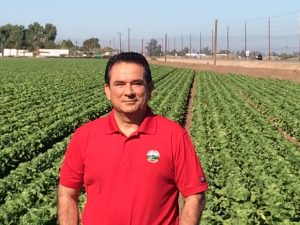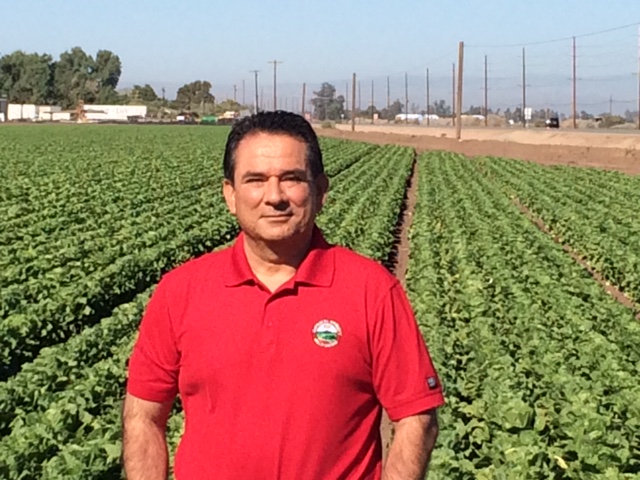
Carlos Ortiz, Imperial County’s Agricultural Commissioner and Sealer of Weights and Measures, is pictured in a Romaine lettuce field near Holtville.
Growing up in Oxnard, the son of a field worker who immigrated to the United States under the Bracero program, Carlos Ortiz wondered why his classmates looked so forward to summer vacation.
For him, summers meant joining his father in the fields.
“I wondered, ‘Why am I out there doing this heavy work when my friends were hanging out at the beach?” Ortiz said.
He eventually came to realize the work he did built character and while he didn’t know it then, he was taking his first steps toward a career in agriculture—one that would guide him to become a leading advocate for Imperial County agriculture.
Ortiz, 57, was named Agriculture Commissioner and Sealer of Weights and Measures for Imperial County in December 2016, placing him in charge of a department that both promotes and protects local agriculture.
It is a task that has him and his staff of 38 preventing the spread of invasive pests that could threaten crops and working with growers on meeting compliance standards in their production—critical to ensuring the continued success of Imperial County’s billion-dollar agriculture industry.
With some 400,000 farmable acres in the county, the role of the Agricultural Commissioner’s Office might seem overwhelming to some, but for Ortiz every step he has taken in his life—including a 29-year career with Imperial County—has prepared him for this role.
“My education got me this job, but I shouldn’t forget all those years as a teenager working as a field worker on my father’s farm,” said Ortiz, who resides in El Centro with his wife of 32 years, Irma. Together, they raised their son, Jonathan, an aerospace engineer.
It has been a long journey to this point in his professional life—one filled with the kind of hard work that only those who have labored in the soil under an unforgiving sun or spent late nights preparing fields—can fully grasp.
“I was not afraid of hard work,” Ortiz said of his early years working in the fields. And he certainly isn’t afraid of hard work today.
Ortiz’s story begins in Guanajuato, Mexico. It’s where he was born, but he didn’t stay there long—at least not at that point in his life. His father, Telesforo Ortiz, who owned his own farm, decided to immigrate to the U.S. under the Bracero program, created under the Mexican Farm Labor Agreement with Mexico. It allowed contract workers to enter the U.S. to work in agriculture.
In the case of Ortiz’s father, his employer made it possible for the entire family to come to the U.S. Ortiz was 4 at the time. He would go on to enroll in schools in Oxnard and began his education there. As he grew up, he eventually joined his father in the fields during weekends and summers.
His father, who passed away in 2010 just shy of his 95th birthday, managed to save money during those years, which enabled him to again buy land in their native Guanajuato.
Part of the family, including Ortiz, returned to Mexico while some remained in Oxnard as his father kept a house there. That enabled his father to spend a portion of the year working in Oxnard, which meant Ortiz had a chance each summer to return as well.
But from the age of 12, Ortiz spent most of his time in Mexico. That’s where he continued his education. It was a tough transition, but it was made easier thanks to his family. He was one of eight brothers and two sisters.
“The language and the culture were sort of a shock,” he said. “We spoke Spanish at home in Oxnard, but it was a struggle attending classes in Spanish in Guanajuato. Since I had several brothers, I don’t think I missed my friends that much and was able to adapt pretty quick.
In Mexico, his weekdays were spent in school but come the weekend, he joined his father on the farm.
“On Friday evenings after school, there goes Carlos to the farm,” he said. “I would get the graveyard shift. I wasn’t angry about it. I had mixed feelings. I told myself, ‘You know this will help you in the future.’”
He added: “if you look at that time, I learned so much about crops, about irrigation, about weather and most importantly about what agriculture truly is, which is definitely different than what you read and learn in textbooks.”
Not only did his father grow several kinds of crops, he raised swine and had a small dairy. Ortiz remembers the success his father had on the family ranch, but also the hard times. There was the year his father lost his 300 pigs to cholera. Then, there was a freeze that wiped out his garbanzo bean crop. It is exactly those kinds of issues he wrestles with today in his ongoing effort to protect local agriculture in Imperial County.
But it wasn’t always Ortiz’s goal to work on the regulatory side of agriculture.
Inspired by his father, he planned to be a grower. He attended university at the Instituto Technologico Y De Estudios Superiores De Monterrey and earned a degree in agricultural engineering in 1983. He had a choice then. Begin his career in agriculture by joining his oldest brother, Jose, in his farming operation in Ventura County. Or, accept a position with the international division of the U.S. Department of Agriculture (USDA) in its Tapachula, Chiapas, office working on the medfly program.
He chose the USDA position and began a career path that would lead him to Imperial County. Ortiz worked a year and a half on the medfly program, developing a sterilized version of the medfly that would be released into the environment to reduce their reproduction and threat to crops. He next transferred to Mexicali for two and half years to work on a program to counter the spread of the boll weevil, which was threatening cotton production.
Then, Ortiz faced another career choice. His work in Mexicali was winding down, which meant he’d be transferred again. However, he found two other options—a position in the Imperial County Agricultural Commissioner’s Office or with the California Department of Food and Agriculture, which would have based him in San Diego.
He accepted the position with Imperial County.
“This area reminded me of Oxnard where I was raised, neighbors knew each other’s name, and helped each other,” Ortiz said. “I took the job in 1988, and this became home.”
Imperial County is where he and his wife raised their son. Though they now reside in El Centro, they spent most of their years in the Valley living in the City of Imperial. And Ortiz made a point of giving thanks to the Imperial school system for the education provided to his son—an education that prepared him to succeed at UC Irvine where he earned his bachelor’s degree and at the University of Southern California where he earned his post graduate degree to become an aerospace engineer.
Ortiz started as an agricultural biologist with the county, working on pesticide use enforcement, eventually became a lead agriculture biologist, then Deputy Agricultural Commissioner and finally Assistant Agricultural Commissioner. When Connie Valenzuela, then Agricultural Commissioner, retired in 2016,
Ortiz was named acting commissioner until December when the county Board of Supervisors named him to the permanent position.
His position includes the title of Sealer of Weights and Measures, a division within his office responsible for inspecting all gasoline pumps, livestock scales, computing scales at all commercial businesses that use such technology, ensuring the consumer who makes purchases is not overcharged for items by flawed devices.
For Ortiz, his department is part of a partnership in the Imperial Valley community meant to support growers, businesses, and the public. It is a partnership built around the ability of Ortiz and his staff to form relationships and to focus on being a support to industry and the public as much as a regulatory department.
With that in mind, Ortiz has focused on outreach efforts, ensuring those within the agricultural industry have the information they need to guarantee their growing methods meet standards and can be as successful as possible in the market.
“It’s about working in partnership to protect agriculture” he said, adding protecting agriculture from threats, like invasive pests, is crucial. Not only can pests damage crops, they can lead to trade embargos that would have devastating impacts on the local economy. That is what Ortiz and his department are working to prevent by building partnerships, reaching out to growers, providing education when needed and remaining vigilant.
Ortiz has a clear understanding of the importance of the county’s agricultural industry.
“It not only is crucial to our economy, but also helps feed the nation with healthy and nutritious food,” he said, adding he intends to work with local growers—with the help of his staff—to ensure Imperial County’s leading role in feeding the country never changes.
It is his way of giving back to the community, being a public servant, and following the path he set for himself long ago from the lessons he learned as a field worker and through the inspiration of his father.
